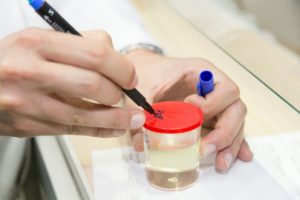
Having some bubbles in the urine is normal, so unless you notice changes or experience other symptoms, bubbles in the urine is not something to worry about.
Normal causes of bubbles in the urine
Rapid urination: Urinating too quickly or forcing urine to come out can be responsible for its bubbly appearance. This is because air is introduced into the urine stream, causing the bubbles. In this case, the bubbles typically disappear within a few minutes.
Concentrated urine: If you’re mildly dehydrated, the urine may become more concentrated, so it appears bubbly. This can be easily resolved by drinking more fluids.
Toilet cleaner: Sometimes, urine reacts with toilet cleaner, resulting in bubbles. If you’re unsure if your urine is bubbly or whether it’s the toilet cleaner causing it to bubble, you can urinate in a separate container that has not been treated with the cleaner and watch for bubbles.
Semen in urine: After sex, small amounts of semen are left in the male urethra. This small amount won’t cause bubbly urine unless the bladder sphincter malfunctions, causing the semen to go back into the bladder. In this case, urine will appear bubbly.
Abnormal causes of bubbles in urine
Proteinuria: This is a condition in which protein is released in the urine in high amounts. Protein is normally released in the urine but in small amounts. When these levels become high, the urine can appear bubbly. This can be a sign of an impending kidney problem as the kidneys are not filtering urine properly and as a result release too much protein. Untreated high blood pressure and diabetes may contribute to kidney filtration problems, along with other factors like toxins, infections, or trauma to the kidneys.
Urinary tract infection: When bacteria enter any part of the urinary tract system you may develop an infection. Along with pain, higher urinary frequency and urgency, and burning while urinating, your urine may appear bubbly as well. You should see a doctor if you begin to experience UTI symptoms because the earlier the treatment begins the less of a risk of complications you will have.
Kidney disease: Bubbly urine can be a sign of kidney disease resulting from kidney stones or diabetes. A simple urine test will determine whether you have kidney disease.
Preeclampsia: Preeclampsia is a pregnancy complication that results in swollen legs, proteinuria, high blood pressure, and headaches. It can be a fatal condition to both mother and fetus, and all symptoms can worsen with its progression.
Vesicocolic fistula: A fistula is an abnormal connection which, in this case, develops between the bladder and the colon. This allows air, gas, and bacteria to travel into the bladder. Along with bubbly urine, a person with vesicocolic fistula will have frequent infections. Symptoms may be similar to those of a UTI.
Other causes: Other causes of bubbly urine include amyloidosis, cancer, chemical poisoning, diabetes, heart conditions like an enlarged heart, high blood pressure, infections, kidney failure, liver disease, lupus, rheumatoid arthritis, sarcoidosis, and sickle cell anemia.
Protein levels in the urine
There is always some level of protein in urine, but if levels are high then it could indicate a problem with the kidneys. Your doctor will analyze your urine sample to see if your protein levels are healthy.
If protein readings are less than three mg/mmol, no further testing is required. If readings are between three and 30 mg/mmol, an annual check-up will be requested. Lastly, any reading over 30 mg/mmol suggests significant leakage of protein, and further testing will be conducted to evaluate your kidney health or check for any other possible cause of proteinuria. At this stage, treatment will also be prescribed.
Treatment options for proteinuria
There are numerous reasons for high levels of protein in the urine, including diabetes, hypertension, and obesity. Protein found in the urine can either be a symptom of an existing kidney condition or a warning sign of an impending kidney problem, so treatment early on can really help your kidneys out.
Here are some natural home remedies that can aid in treating proteinuria:
- Eat plenty of fruits and vegetables, grains, and legumes.
- Lean meats are better than red meat, as the latter is harder to break down.
- Consume more fish.
- Restrict salt intake.
- Drink plenty of water and avoid soda.
- Exercise regularly.
- Minimize alcohol intake.
- Reduce stress levels.
- Maintain a healthy weight – lose weight if you are overweight or obese.
- Add onions and garlic to your meals.
Related: Urine specific gravity test: How well your kidneys are diluting your urine